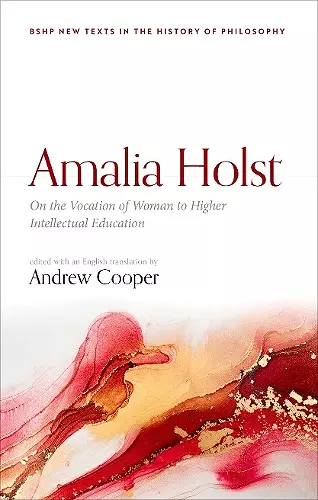Amalia Holst: On the Vocation of Woman to Higher Intellectual Education
Format:Hardback
Publisher:Oxford University Press
Published:17th Aug '23
Should be back in stock very soon

This edition offers the first English translation of Amalia Holst's daring book, On the Vocation of Woman to Higher Intellectual Education (1802). In one of the first works of German philosophy published under a woman's name, Holst presents a manifesto for women's education that centres on a basic provocation: as far as the mind is concerned, women are equal partakers in the project of Enlightenment and should thus have unfettered access to the sciences in general and to philosophy in particular. Holst's manifesto resonates with the work of several women writers across Europe, including Olympe de Gouges, Mary Wollstonecraft, and Germaine de Staël. Yet in contrast to the early works of feminism we celebrate today, her book had little success. Its reception confronts us with a darker side of the German Enlightenment that, until recently, has been neglected. Holst sought to unearth the gendered nature of the fundamental concepts of the Enlightenment--including vocation, education, and culture--which enabled men to establish the subordinate status of women by philosophical means. However, her argument was scorned by male reviewers, who denied the very possibility of a woman philosopher. With an introduction by Andrew Cooper, and translations of biographical material and early reviews, this edition provides students and scholars of German philosophy with a timely resource for developing a richer understanding of their field, and general readers with a powerful early feminist text that reveals the opportunities and difficulties facing women philosophers at the turn of the nineteenth century.
This excellent translation makes Amalia Holst's important and powerful book available to English-speaking readers for the first time, greatly advancing the recovery of German women philosophers. Andrew Cooper's superb introduction situates Holst in the context of German Enlightenment debates about the purpose of education and the vocation of woman, and carefully compares Holst's position to those of her male and female contemporaries. The book will be invaluable reading for all those seeking to recognise women's contributions to nineteenth-century philosophy. * Alison Stone, Lancaster University *
Andrew Cooper's seamless translation of Amalia Holst's On the Vocation of Woman to Higher Intellectual Education is cause for celebration. In this work, Holst makes crucial contributions to the "vocation debates" of the eighteenth century, and offers insightful and penetrating critiques of her male contemporaries, who, in contrast to Holst, repeatedly argued that women were not fit for philosophical education. Her insightful and penetrating critiques reveal the extent to which these apparently enlightened thinkers were not able to fulfill the goals of the Enlightenment. And Holst seeks to do just that. This work is bound to transform the ways we teach and research this crucial moment in the history of philosophy, challenging us not only to expand the philosophical canon but also to rethink trusted philosophical premises and arguments. * Dalia Nassar, University of Sydney *
Could there be a more relevant and much-needed book in eighteenth-century philosophy than Andrew Cooper's translation of Amalia Holst's On the Vocation of Woman to Higher Education (1802)? Holst argues for women's right to education and, in effect, takes to task the aspirations of a whole generation of Enlightenment thinkers. If the right to education is reserved for a segment of the population (male individuals), can we then say that the Enlightenment is committed to the uplift of the human being as such? Cooper's introduction to Holst's work is thorough, clear, and engaging; it provides a superb induction to Holst's important contribution and its relevance today. This text is a "must" for anyone interested in the philosophy of education, the critical potential of Enlightenment thought, and the politics of gender in recent history. * Kristin Gjesdal, Temple University *
ISBN: 9780192845948
Dimensions: 222mm x 143mm x 20mm
Weight: 410g
224 pages